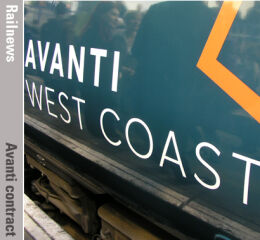Posted 13th June 2024 | 2 Comments
Labour warns Avanti West Coast is early nationalisation candidate

The Labour Party is planning to begin its rolling programme of nationalising private sector passenger operators with Avanti West Coast.
Owned by FirstGroup and Trenitalia, the former franchise was only given a National Rail Contract in September last year. This contract began on 15 October and was to run for at least three years, with extensions possible until October 2032.
Until last September, Avanti had worked under two six-month emergency contracts, to allow time for its services to recover from major performance problems which were mainly caused by a shortage of drivers.
Shadow transport secretary Louise Haigh said standards had continued to be ‘woeful’. In its document Getting Britain Moving Labour has already undertaken to end National Rail Contracts over time, as they expire or reach a break point, but Ms Haigh made it clear that Avanti’s time may be shorter than that if her party wins the election, three weeks from today.
She said: ‘I anticipate I will be seeking advice early on whether Avanti has been in breach of its contract given the woeful service that it’s been providing to passengers down the West Coast Main Line.
‘No ifs, no buts, October 2026 will be the last date Avanti will have notice, but I will ask for early advice about whether they have already breached their contract and whether it can be brought in any earlier.’
Transport for the North has already urged the government to end the Avanti operation.
Avanti did not comment directly on the prospect of early termination, saying only: ‘Recently we have introduced our new Evero fleet on the West Coast Main Line which has boosted capacity on the network. This combined with our refurbishment of our Pendolino trains, the introduction of standard premium and our Superfare ticket has significantly improved our services.’
The operator has recently started to introduce new Hitachi-built replacements for the Bombardier Voyager fleet, which is now more than 20 years old.
Reader Comments:
Views expressed in submitted comments are that of the author, and not necessarily shared by Railnews.

david C smith, Bletchley
The contention re failure was made so as to include the investment crises - an essential part of the nationalisation system. And, yes Mrs T was well known for an anti - rail position ; thanks be that one - time transport minister M Portillo changed his stance . It was the Governmental ability to wreck the railway that seems to be the main problem with natioalisation.
[A further problem, apart from money, is that it has been a rare government that actually understands the industry well enough to make investment decisions.--Ed.]
david C smith, Bletchley
I'm not anti - public ownershIp , but railway nationalisation was tried and found wanting. On the other hand, trying to run Merseyrail or TfL ,or other natural monopoly , as private enterprise won't work either. Can the political people think of something different , this time around ?
[Railway nationalisation was NOT 'tried and found wanting'. BR was the most efficient railway in Europe in the 1980s. It had more trains running at 160km/h-plus on conventional track than any other country. It was, however, starved of capital investment by successive governments who thought motorways were the future, particularly the governments of Mrs Thatcher. The illusion that passenger railways can be directly profitable continued to obsess ministers into the privatisation era.--Ed.]